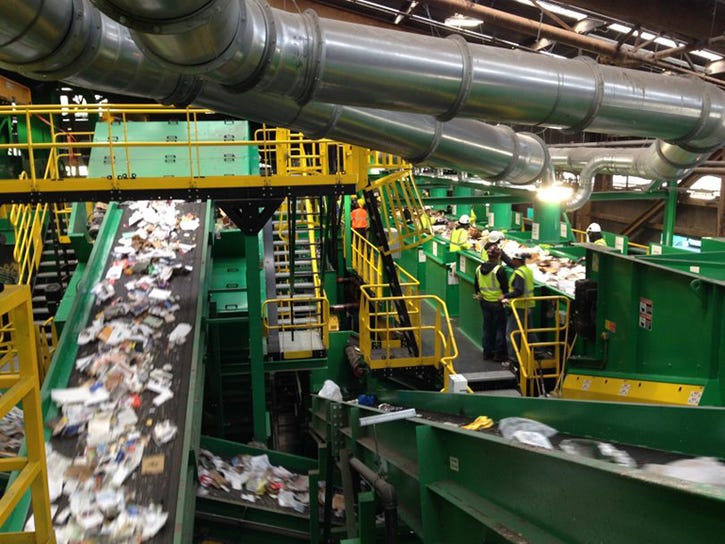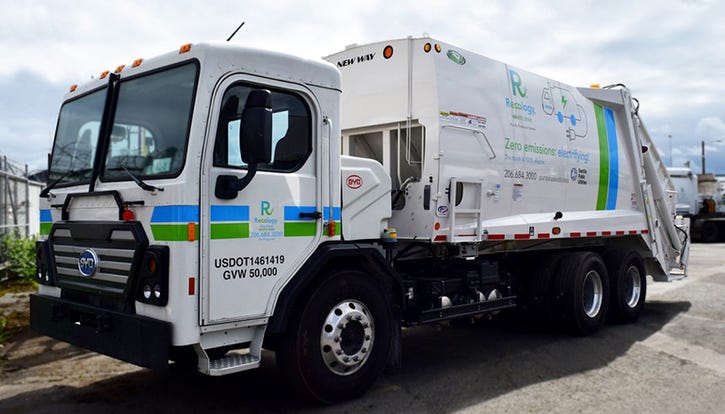Butler Helps Lead Recology’s Growth Strategy and Innovation Initiatives
The Waste360 40 Under 40 award winner discusses how she’s helped Recology negotiate and close acquisitions and what goals Recology is working to achieve.

Meghan Butler, who has always had an interest in the environment, has worked her way up the ladder at Recology, an integrated resource recovery company headquartered in San Francisco. She began her career as an intern and is now serving as the company's director of corporate development.
Throughout her career, she has helped grow the company, execute new business opportunities, integrate new technologies into operations and lead innovation initiatives.
“Meghan has a voracious appetite for learning,” says Michael Sangiacomo, CEO of Recology. “She is always willing to take on new roles to help the company succeed, and, in turn, she has succeeded in each role, as she is a quick study and brings the skills she’s learned along the way to new projects.”
“As Meghan continues to lead Recology’s corporate development and innovation initiatives, she will ensure that Recology, and the communities we serve, continue to move toward maximizing recovery of valuable resources, finding additional opportunities for the utilization of these materials and partnering with local entities to accomplish these goals in ways that benefit our environment,” he adds. “These are principles that are extremely important on our country’s West Coast, particularly as drought and warmer weather continue to degrade the quality of life with ongoing fire episodes and other events that wreak havoc on our environment.”
We recently sat down with the Waste360 40 Under 40 award winner to discuss how she's helped Recology negotiate and close acquisitions, what goals Recology is working to achieve and what her typical workday is like.
Waste360: How did your career in the waste and recycling industry begin?
Meghan Butler: I’ve always had an interest in the environment. One of my favorite things to do is to spend time in nature, so when I had the opportunity to work for a company like Recology, I jumped at the chance.
It was about a decade ago, while I was still in school, that I was exposed to Recology. I reached out to them directly to inquire about open positions, and I was offered an internship in the government relations department. That internship later turned into a permanent, full-time position also in the government relations department.
From there, I’ve held a number of different roles at Recology, and through those roles, I’ve benefitted from being able to be entrenched in all the various aspects of the company, from collection and processing to construction and business development.
Waste360: You now serve as director of corporate development at Recology. What’s your typical workday like?
Meghan Butler: My role comprises three main areas: overseeing Recology’s mergers and acquisitions activity, which includes informing our executive team about acquisition strategy as well as evaluations and eventual execution; managing our sales and marketing department, which includes the sale of all the commodities and organics products we produce from the material we collect from the states we operate in; and leading Recology’s innovation initiatives, which could be anything from investing in a new type of technology or company to rolling out an internal program to engage our employees.
The best part of my job is that no two days are similar. One day, I could be negotiating a contract, and the next day, I could be hosting an innovation summit for Recology’s interns. My job really keeps me on my toes, but I love learning all the new aspects that this industry has to offer.
Waste360: During your time at Recology, you’ve helped the company negotiate and close four acquisitions, expanding its operations throughout the state of California. Tell us about that.
Meghan Butler: At Recology, we examine a merit of opportunities every year for potential acquisitions, and we’re often selective about the potential acquisitions we’ll pursue because we need to bring creative value to the company from a financial and strategic perspective. We’re a 100 percent employee-owned company, so it’s important that there’s a very strong cultural fit.
Between December 2016 and April 2018, there were a number of opportunities that made sense for us, and Recology closed four acquisitions that year in Northern California.
Every acquisition is unique, and you come away from each one learning something new. For someone in my role, that’s great because it never gets old and there’s always a new challenge.
Looking to the future, we’re motivated and excited to grow and bring our community-centric and employee-ownership mindset to new places.
Waste360: What are some other career achievements you’re most proud of?
Meghan Butler: Simply stated, I’m proud of the career I’ve developed as a young woman in the industry. Starting as an intern and growing into a director-level position is something that has taken time and hard work. I’m grateful for the opportunity Recology has given me.
Waste360: Recology has been adding more technology to Recycle Central. Can you tell us about the technology that’s in use?
Meghan Butler: In 2017, Recology invested more than $11 million to do a fully comprehensive upgrade to the Recycle Central materials recovery facility in San Francisco. With the upgrade, we installed two new sorting lines, doubled our optical sorting capabilities and significantly reduced the amount of residual coming out of the system.

Since then, we’ve continued to invest in more technology to improve the quality of our products and to increase operational efficiencies. Most recently, we installed two additional optical sorters on our fiber line as well as four Max-AI robots on our container line that help to enhance our quality control.
The quality of our products is of the utmost importance to us, so we continue to make investments in our recycling infrastructure to ensure that we can achieve the best quality possible and put more throughput through the machines.
Waste360: In May, BYD delivered a demo unit of its battery-electric refuse truck to Recology. How did that testing go and can you provide any updates on Recology’s fleet?
Meghan Butler: We had a demo unit of the BYD truck in our Seattle fleet, and it was used for route planning purposes. The truck lasted all day on routes that were low stops and low volume but had a lot of windshield time. That demo unit has now moved on to demo in other places, but we do have Gen2 vehicles coming in the new calendar year for full route use in Seattle.
These Gen2s will provide us with more capacity and kilowatt hours, extending the operating range and hours of service, which will be great because one of the difficulties with the demo unit was its ability to do a full route in the time that we needed on the battery that it had.
We’re now looking to implement electric route vehicles in a number of our other service areas, and it’s through partnerships like the ones we’ve created with New Way, BYD and the city of Seattle that can make an impact in implementing sustained, meaningful change for better ways of doing business in the waste industry.

Waste360: Looking forward to 2020, what are some of Recology’s short- and long-term goals?
Meghan Butler: As we look to the future, Recology strives to achieve our vision of living in a world without waste and aims to integrate our sustainability ethos with communities that align with our company values.
Collaborating with communities to bring creative and progressive resource recovery strategies to new regions benefits our customers, the company and a natural environment, so we’re excited to be part of those solutions.
In the near term, we’re focusing on finding ways to work with the plastics manufacturing industry to embrace the change that’s required to solve the current plastics crisis that we’re all facing. I look forward to the hopeful partnerships with those in the plastics industry to see what types of technological and manufacturing solutions we can develop.
Waste360: What is the hardest part of your job? The best part?
Meghan Butler: Earlier I mentioned the best part is that no two days are similar. Adding to that, I have the privilege of working with every one of our operating groups and departments at Recology, which allows me to collaborate with, contribute to and learn from all the creative minds in our company.
These experiences have made my work more meaningful and have helped me to enhance my skills, allowing me to be more effective in bringing more well-rounded solutions to the challenges and opportunities that Recology faces.
The hardest part of my job would probably be time. There never seems to be enough time to explore all the promising possibilities that are in front of us, but then again, I like to think of it as an opportunity to bring more bright minds into the industry to tackle all of that potential. It’s an exciting problem to have!
Waste360: What is your leadership style?
Meghan Butler: I would describe myself as a logical dreamer, if there is such a thing! I thrive off the possibilities of what could be, and I’m grounded by the specific puzzle pieces that we’re able to play with.
I believe I’ve succeeded because of this, and I really try to support and guide those around me to pursue what they believe will make them successful in their own roles because in turn, the company and the larger community will also succeed.
Waste360: What advice would you give to someone just starting their career?
Meghan Butler: I would say advocate for what you think will make a difference, including yourself, and use your creativity when problem solving. The big leaps in this industry will not come from the ways we’ve always been doing things; there’s endless opportunity for positive change.
About the Author
You May Also Like




